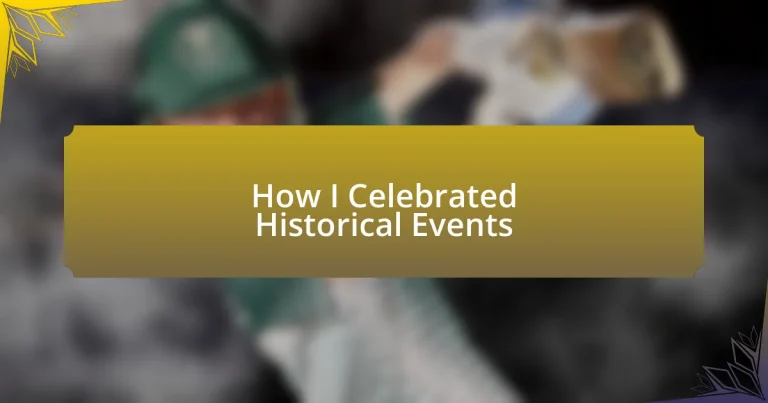Key takeaways:
- Historical events have personal significance, shaping individual identities and inspiring social justice.
- Key historical events to celebrate include Independence Day, Martin Luther King Jr. Day, International Women’s Day, Earth Day, and Veterans Day, promoting reflection on progress and ongoing efforts for justice.
- Planning celebrations thoughtfully—incorporating context, local culture, and interactive elements—enhances the connection to history and community.
- Creative ideas like workshops, living history reenactments, and storytelling circles can make historical celebrations memorable and educational.
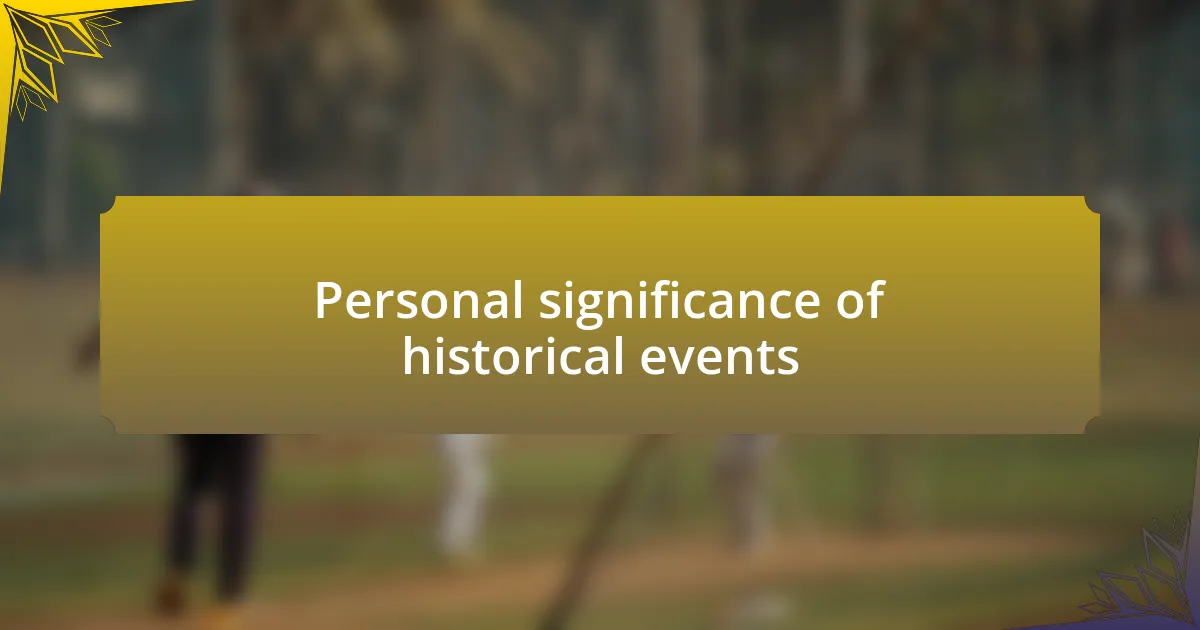
Personal significance of historical events
Reflecting on historical events often uncovers layers of personal significance that I never anticipated. For instance, when I learned about the civil rights movement, I felt a deep connection to the struggle for equality, which ignited a passion for social justice in my own life. It raised profound questions for me: How have these events shaped my identity, and what can I do to honor their legacy?
One particular moment that stuck with me was celebrating the anniversary of a landmark treaty in my school. I remember being assigned to present on its implications, and as I dove into research, I felt a surge of pride in understanding how history shapes our present. It’s almost as if every date I learned wasn’t just a fact but a chapter of humanity that taught me resilience and hope.
I often wonder how many people take the time to reflect on the historical events that resonate with them personally. There’s something powerful about connecting one’s life story to the broader tapestry of history. It makes me realize that each of us has a unique lens through which we interpret the past, enriching our understanding of who we are today.
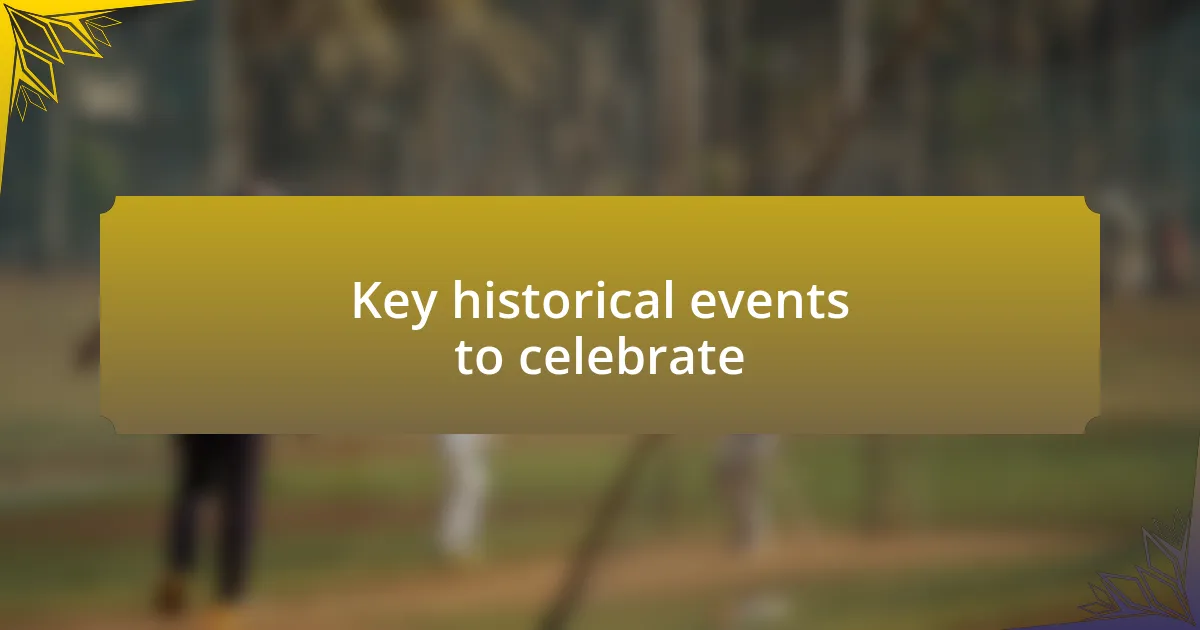
Key historical events to celebrate
Celebrating key historical events can be a deeply enriching experience, connecting us to moments that transformed societies and inspired individuals. I recall celebrating Independence Day and feeling a sense of unity as fireworks lit up the sky. It’s not just a holiday; it’s a reminder of the sacrifices made for our freedom. Each year, gathering with friends and family, I find myself reflecting on what that day represents—not just for our nation, but for everyone who has fought for the right to live freely.
Here are some key historical events that are particularly meaningful to celebrate:
- Independence Day (July 4): A celebration of freedom and national identity.
- Martin Luther King Jr. Day: Honoring the legacy of civil rights and equality.
- International Women’s Day (March 8): Acknowledging the struggles and achievements of women worldwide.
- Earth Day (April 22): Promoting environmental awareness and sustainable practices.
- Veterans Day (November 11): Recognizing the sacrifices of military personnel.
These events not only mark our calendars but also invite us to consider the progress we’ve made and the work that still lies ahead. By celebrating them, I find that I grow more aware of my role in continuing the journey toward justice and equality. Each event is a call to action, urging us to reflect, honor, and work towards a better tomorrow.
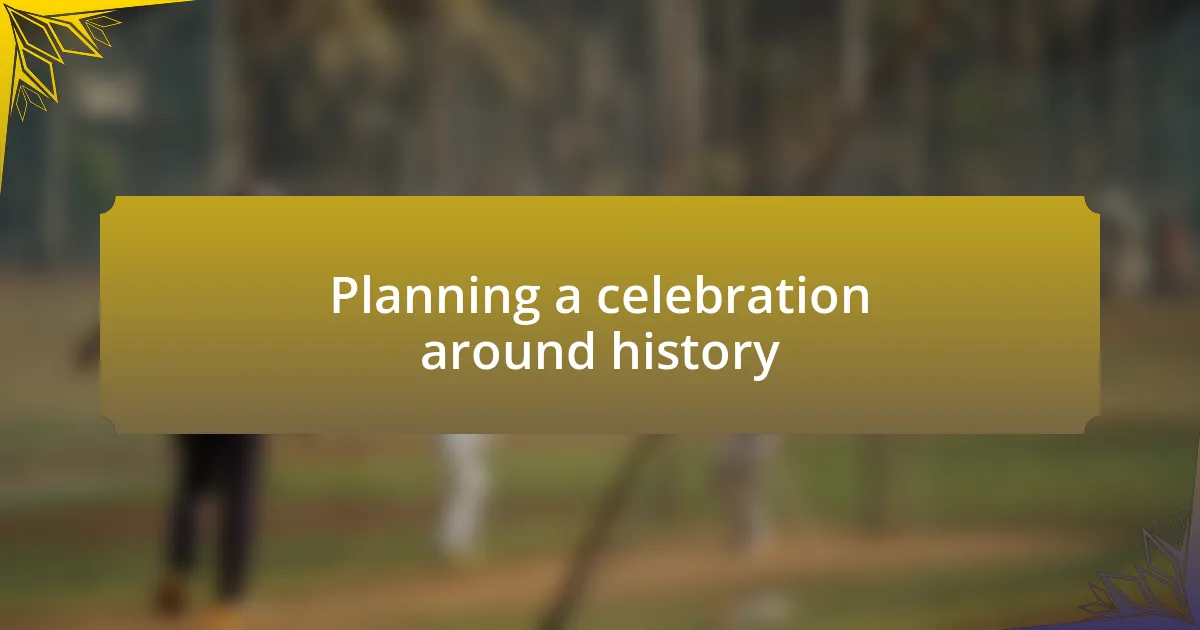
Planning a celebration around history
When planning a celebration around historical events, it’s essential to consider the context and significance of each occasion. I’ve found it helpful to research the origins of these events, as it adds depth to our celebrations. For example, during International Women’s Day, I often invite a guest speaker who can share stories of women’s achievements, providing a platform for voices that deserve to be heard. This not only enriches the gathering but creates a memorable experience that resonates with everyone involved.
Timing and location also play crucial roles in planning. I’ve realized that celebrating Earth Day outdoors, perhaps in a local park or community garden, fosters a connection with nature that reinforces the day’s message. I’ve set up workshops to teach sustainable practices, which make the celebration interactive and educational. Engaging activities allow attendees to leave with practical knowledge that reinforces the importance of caring for our planet.
Lastly, incorporating creative elements can really enhance the atmosphere of the celebration. I remember hosting a themed trivia night for Veterans Day, where friends and family gathered to learn about the contributions of veterans throughout history. It turned out to be both fun and enlightening, with everyone eager to share insights and learn together. Planning with intention transforms these moments into invaluable opportunities to reflect and connect.
| Event | Planning Ideas |
|---|---|
| Independence Day | Fireworks, community barbecues, sharing history through storytelling. |
| Martin Luther King Jr. Day | Guest speakers, discussion panels on civil rights. |
| International Women’s Day | Workshops, celebrating local women’s contributions, storytelling. |
| Earth Day | Outdoor activities, sustainable workshops, community clean-ups. |
| Veterans Day | Themed trivia nights, recognition ceremonies for local veterans. |
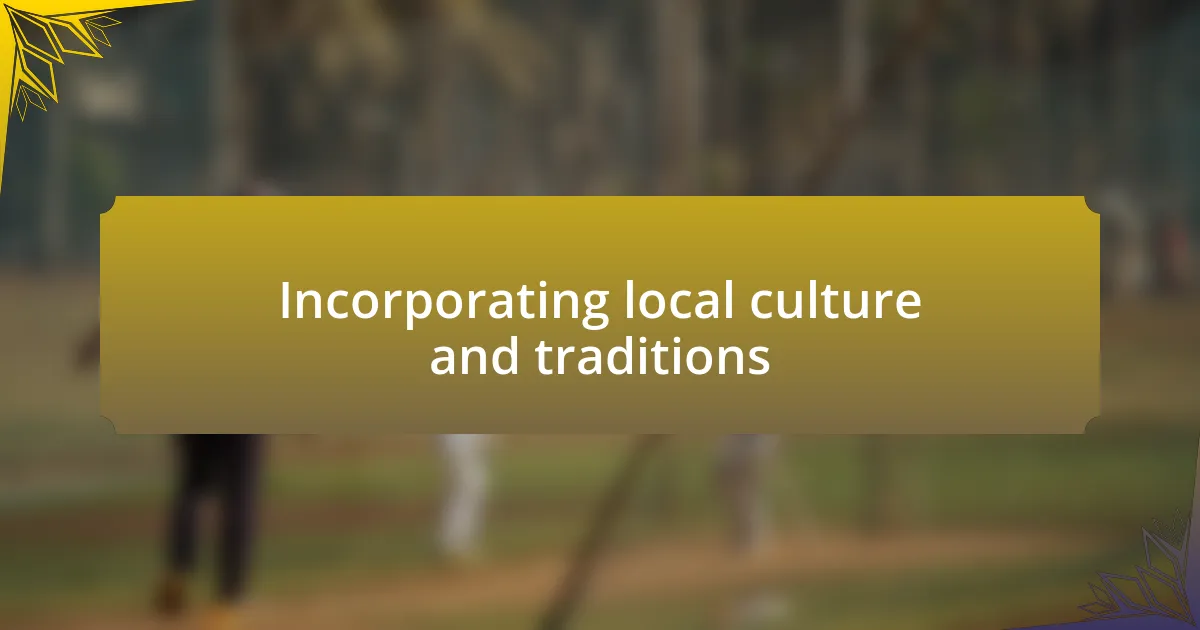
Incorporating local culture and traditions
Incorporating local culture and traditions into celebrations can really amplify the experience. I remember one year during Indigenous Peoples’ Day; our community organized a potluck where everyone brought a traditional dish from their cultural background. Sharing food not only opened the door to unique flavors but also encouraged conversations about the stories behind each recipe. Isn’t it incredible how food can bridge cultural gaps?
Additionally, integrating local art forms can elevate an event’s significance. For example, when we celebrated Juneteenth, we showcased local artists who depicted themes of freedom and resilience in their work. This approach created an immersive atmosphere that connected the celebration to the local community’s rich history. I found that when people see their culture reflected in art, it ignites pride and fosters a deeper understanding of the event being commemorated.
Lastly, I’ve discovered that traditional music often serves as a powerful backdrop for celebrations. At a recent Memorial Day gathering, we invited local musicians to perform songs that honored veterans and their sacrifices. The heartfelt melodies created an emotional environment that united attendees, reminding us that history is not just to be remembered but also felt. How do you think music can deepen the connection to our commemorations?
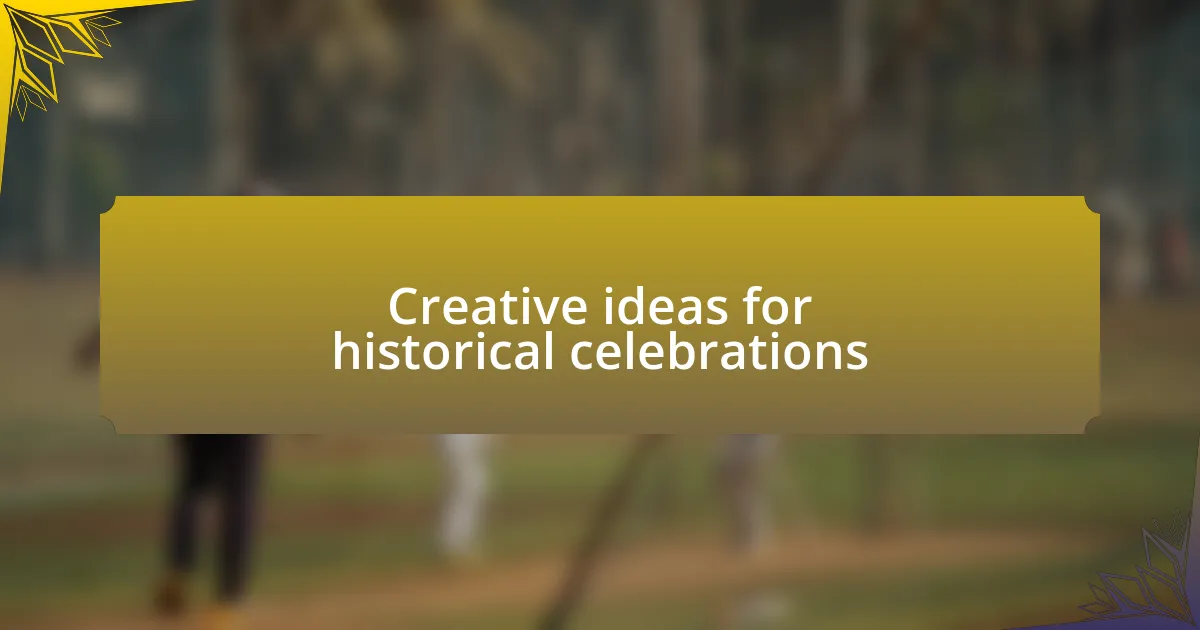
Creative ideas for historical celebrations
To make historical celebrations truly memorable, I believe incorporating interactive workshops can be incredibly rewarding. During a recent Founding Day celebration, we held a hands-on session where participants learned traditional crafts from that era. It was fascinating to see people of all ages come together, creating their own pieces of history right before our eyes. Have you ever thought about how crafting can make us feel connected to the past?
Another creative idea is to host living history events, where participants dress in period costumes and reenact significant moments. I once attended a Revolutionary War reenactment that was so immersive, I felt like I was stepping back in time. It sparked conversations and curiosity about historical events, transforming the celebration into an educational experience. Isn’t it amazing how walking in someone else’s shoes, even for a moment, can deepen our appreciation for history?
Lastly, I find that themed storytelling circles can add a unique layer to any historical celebration. For instance, at a Black History Month event, we gathered to share personal narratives about our ancestors’ struggles and triumphs. Listening to those stories not only honored the past but also connected us on a personal level, as we realized we all share threads of resilience and hope. How do stories shape your understanding of history?
